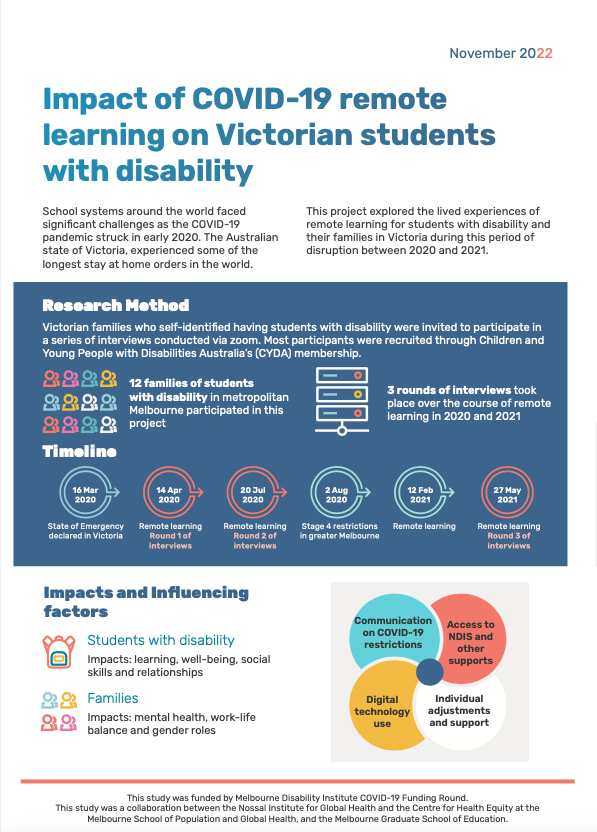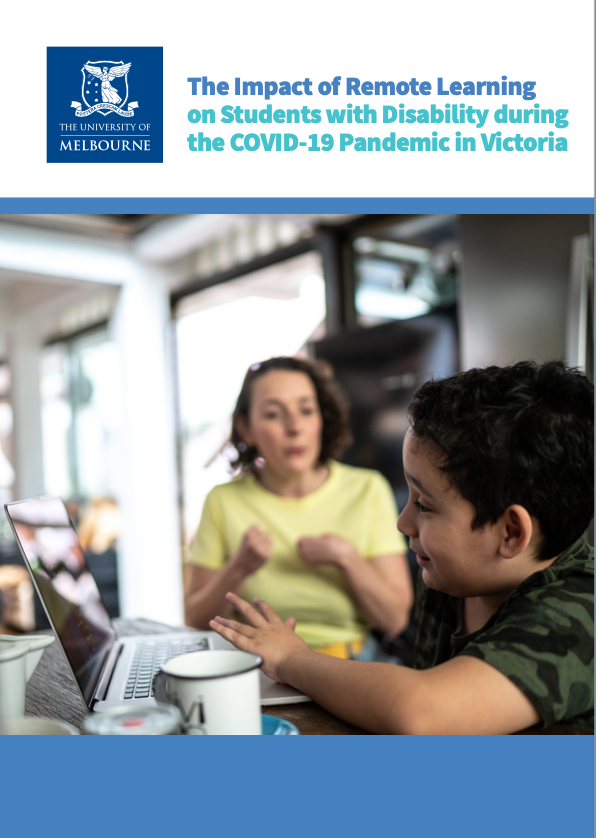The Impact of Remote Learning on Students with Disability during the COVID-19 pandemic in Victoria
Significant challenges for school systems around the world rapidly came into focus as the global COVID-19 pandemic materialised in early 2020. The state of Victoria, Australia, particularly metropolitan Melbourne experienced one of the longest lockdowns in the world during the COVID-19 pandemic. The Nossal Institute’s Disability Inclusive Health and Development in collaboration with the Centre for Health Equity, Melbourne School of Population and Global Health and Melbourne Graduate School of Education, has undertaken a study on the impact of remote learning on families of students with disabilities in Victoria during 2020 and 2021.
Twelve Victorian families who self-identified having with students with disability participated in three rounds of interviews sharing their lived experiences during remote learning periods of April 2020, July 2020, and May-June 2021. Findings from this study identified gaps in meeting the needs of students with disability in remote learning.
Our study showed exacerbation of existing systemic issues for the inclusion and participation of school students with disability in education. Impacts on students were related to their learning, well-being, social skills, and relationships. Parents reported their children lost a year of learning and development, which particularly impacted students transitioning into and out of secondary school. The loss of the structure of school and missed social opportunities to be with peers saw increasing levels of stress and anxiety amongst many students. However, for some students quiet learning spaces and flexibility with learning at home improved mental well-being and reduced fatigue associated with rushing between school, therapies, and other activities.
The impact of remote learning on families was equally concerning. The increased responsibility placed on parents, particularly mothers, to support learning during the lockdowns, often made managing already stretched caring and work responsibilities even more challenging. These issues were compounded by financial hardship and the emotional toll on relationships that were often exacerbated by the pandemic.
These impacts on the students and families were influenced by factors related to barriers to communication between schools and parents, insufficient supports and accommodations for individualised learning, selection and use of digital technologies, and limited access to and use of NDIS funding and other supports during the pandemic.
This study highlights the need for greater preparedness to ensure that students with disability have their needs seen and met in future crises. Key to this is improving capacity and resourcing of schools to provide quality and individualised teaching to students with disability, including through enhanced expertise to utilise digital technology. Additional educational investments to support students with disability to catch-up on lost learning, tailored mental health supports for students with disability and their families during and post crises to aid recovery are also required. Clearer information sharing with local partners and agencies providing support through NDIS funding would assist in securing resources for support, enabling families and schools to work together.
Lead researcher: Manjula Marella Nossal Institute for Global Health, Melbourne School of Population and Global Health
Team members: Lisa Gibbs, Alexandra Devine, Matthew Harrison, Catherine Smith, Fleur Smith, Lana Logam, Felix Kiefel-Johnson

